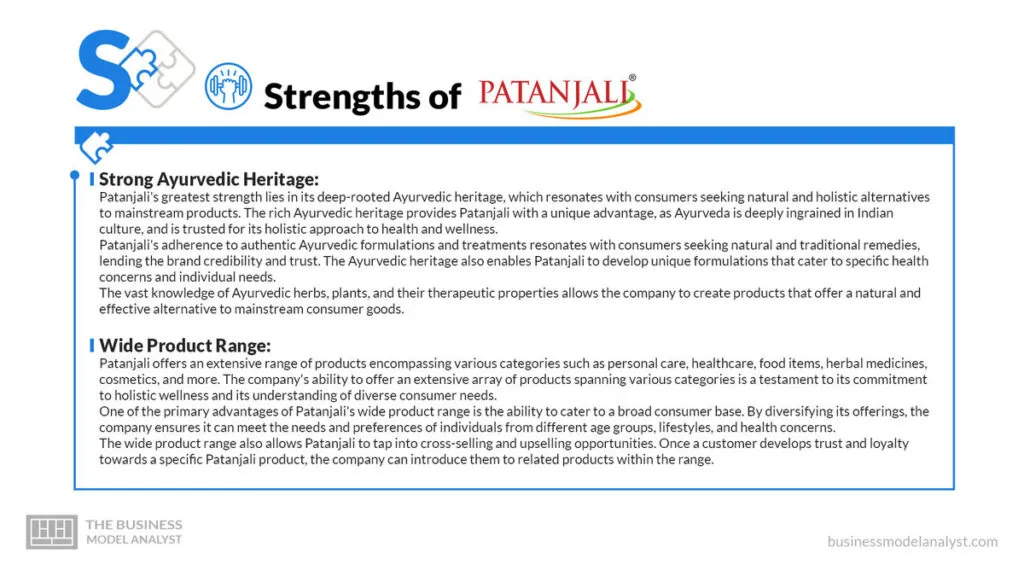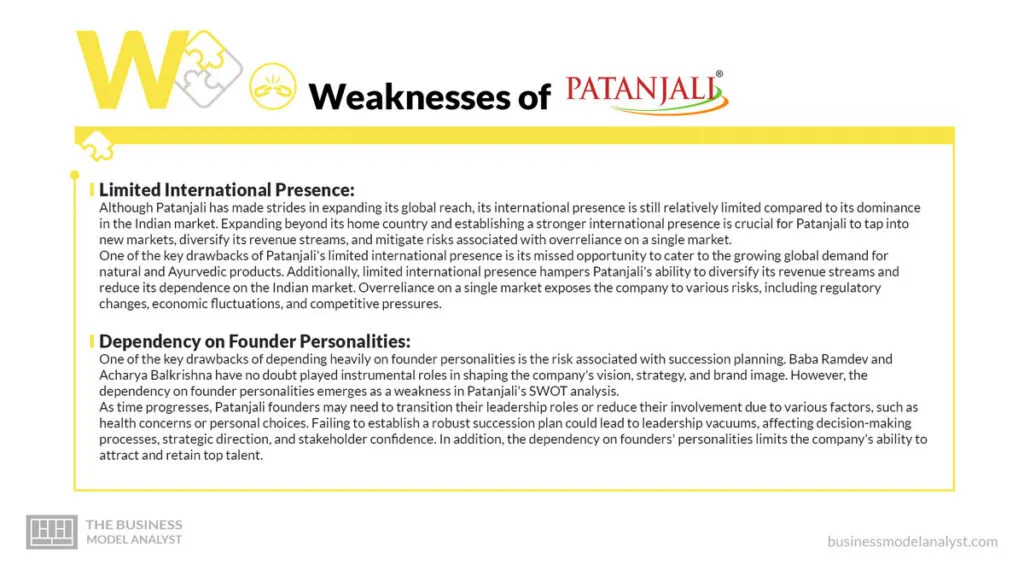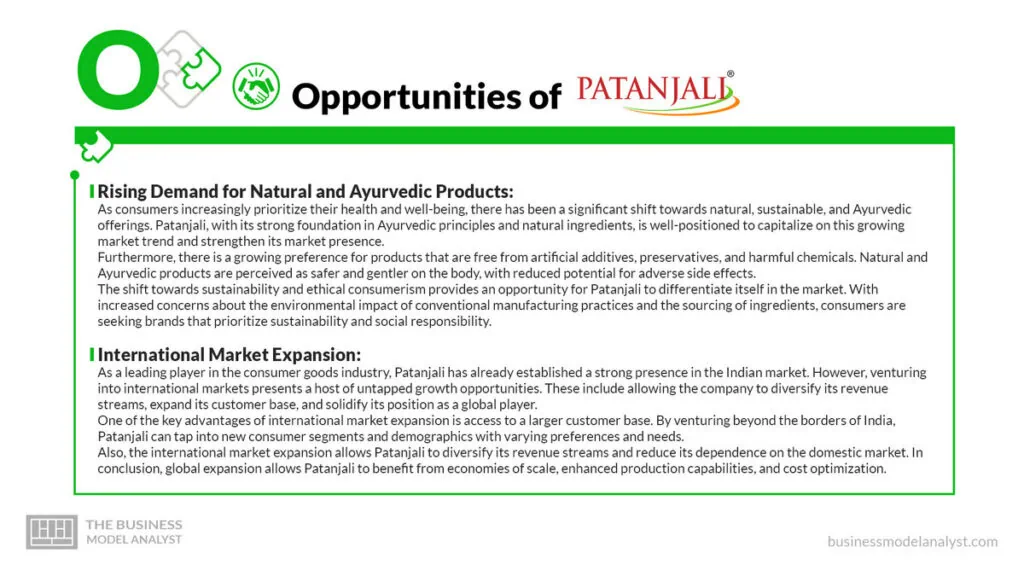The Patanjali SWOT analysis delves into the internal dynamics and external factors influencing the trajectory of Patanjali Ayurved Ltd., a global leader in the FMCG sector. Patanjali is a consumer goods company based in India, that specializes in the production and sale of Ayurvedic and natural products. The company boasts an extensive product portfolio that caters to various aspects of daily life.
From herbal toothpaste and natural skin care products to herbal teas and Ayurvedic medicines, the company offers consumers diverse options to enhance their well-being. Each product undergoes rigorous testing and adheres to strict quality control measures to ensure that customers receive the best-in-class Ayurvedic formulations.
The foundations of Patanjali can be traced to the rich heritage of yoga and Ayurveda. The company was founded in 2006 by yoga guru, Baba Ramdev, and Acharya Balkrishna. Baba Ramdev, a renowned yoga guru, has been imparting yoga knowledge and promoting its benefits for years.
Recognizing the immense potential of Ayurveda, an ancient Indian system of medicine and well-being, Baba Ramdev teamed up with Acharya Balkrishna, a learned scholar of Ayurveda, to establish Patanjali Ayurved Ltd. The company takes its name from the revered sage Patanjali, who compiled the Yoga Sutras, a seminal text that expounds the principles and philosophy of yoga.
Patanjali Ayurved Ltd. began its journey modestly, with a small range of Ayurvedic products primarily focused on healthcare and personal care. With Baba Ramdev’s influential presence and Acharya Balkrishna’s deep knowledge of Ayurveda, the company gained traction among health-conscious consumers in India.
The emphasis on the use of natural ingredients, traditional manufacturing techniques, and the absence of harmful chemicals struck a chord with individuals seeking alternatives to mainstream consumer goods.
As Patanjali’s popularity grew, so did its product portfolio. The company expanded its offerings to include a wide array of items such as food products, herbal teas, health supplements, cosmetics, and more. By providing high-quality, affordable alternatives to multinational brands, Patanjali captured a significant market share in India. The company’s commitment to quality control and ethical practices further cemented its position as a trusted brand.
Patanjali’s commitment to delivering top-notch products led to the establishment of state-of-the-art manufacturing units equipped with modern machinery and technology. These facilities combined the best of traditional Ayurvedic practices with contemporary manufacturing techniques, ensuring that each product adhered to strict quality standards.
Additionally, Patanjali invested in research and development, constantly exploring new formulations and innovative products to cater to evolving consumer needs. Driven by its mission to promote Ayurvedic principles worldwide, Patanjali embarked on a journey of global expansion.
In addition to its extensive presence in India, the company ventured into international markets, exporting its products to countries such as the United States, Canada, the United Kingdom, Australia, and several others. This globalization strategy enabled Patanjali to reach a broader audience, spreading the message of holistic wellness beyond Indian borders.
With its extensive range of natural and Ayurvedic products, Patanjali has gained recognition and captivated the attention of industry experts and health-conscious consumers worldwide. In this article, we will conduct a comprehensive examination of Patanjali Ayurved Ltd.’s strengths, weaknesses, opportunities, and threats with the aim to shed light on its prospects for future growth.
Contents
Patanjali Strengths

The following are the factors that serve as strengths for Patanjali:
- Strong Ayurvedic Heritage
Patanjali’s greatest strength lies in its deep-rooted Ayurvedic heritage, which resonates with consumers seeking natural and holistic alternatives to mainstream products. The rich Ayurvedic heritage provides Patanjali with a unique advantage, as Ayurveda is deeply ingrained in Indian culture, and is trusted for its holistic approach to health and wellness.
Patanjali’s adherence to authentic Ayurvedic formulations and treatments resonates with consumers seeking natural and traditional remedies, lending the brand credibility and trust. The Ayurvedic heritage also enables Patanjali to develop unique formulations that cater to specific health concerns and individual needs.
The vast knowledge of Ayurvedic herbs, plants, and their therapeutic properties allows the company to create products that offer a natural and effective alternative to mainstream consumer goods.
- Wide Product Range
Patanjali offers an extensive range of products encompassing various categories such as personal care, healthcare, food items, herbal medicines, cosmetics, and more. The company’s ability to offer an extensive array of products spanning various categories is a testament to its commitment to holistic wellness and its understanding of diverse consumer needs.
One of the primary advantages of Patanjali’s wide product range is the ability to cater to a broad consumer base. By diversifying its offerings, the company ensures it can meet the needs and preferences of individuals from different age groups, lifestyles, and health concerns.
The wide product range also allows Patanjali to tap into cross-selling and upselling opportunities. Once a customer develops trust and loyalty towards a specific Patanjali product, the company can introduce them to related products within the range.
- Cost-Effective Pricing
One of Patanjali’s key strengths is its ability to offer products at competitive prices compared to multinational brands. This strategic approach to pricing drives the company’s success and positions it as a market leader.
One of the primary benefits of Patanjali’s cost-effective pricing is its ability to make natural and Ayurvedic products affordable and accessible to a wide range of consumers. While the market is flooded with multinational brands that often come with a premium price tag, Patanjali’s commitment to cost optimization enables it to offer competitive prices without compromising on quality.
In addition to customer acquisition and accessibility, cost-effective pricing generates customer loyalty and repeat business.
- Brand Recognition and Trust
Over the years, Patanjali has successfully built a strong brand image and gained consumer trust through its focus on quality, natural ingredients, and adherence to Ayurvedic principles. Through its unwavering commitment to quality, authenticity, and Ayurvedic principles, Patanjali has firmly established itself as a household name.
One of the key advantages of Patanjali’s brand recognition is its ability to command consumer attention and stand out amidst a sea of competitors. With its distinct packaging, logo, and consistent branding across all its products, Patanjali has created a visual identity that is instantly recognizable. The brand recognition achieved by Patanjali also translates into heightened consumer trust.
- Strong Distribution Channels
Apart from its high-quality products, Patanjali also owes its success due to its robust and extensive distribution network. The company’s strong distribution channel is a key strength that plays a pivotal role in its success and market dominance.
One of the primary advantages of Patanjali’s strong distribution channel is its ability to reach consumers across diverse geographies. The company has strategically established a wide network of distribution partners, including wholesalers, retailers, and e-commerce platforms, ensuring that its products are available to consumers in both urban and rural areas.
Furthermore, the distribution channel strength also allows Patanjali to respond swiftly to changing market dynamics and consumer preferences. In conclusion, the strong distribution channel acts as a barrier to entry for potential competitors.
Patanjali Weaknesses

The following are factors that can weaken Patanjali’s position as an industry leader, in the market:
- Limited International Presence
Although Patanjali has made strides in expanding its global reach, its international presence is still relatively limited compared to its dominance in the Indian market. Expanding beyond its home country and establishing a stronger international presence is crucial for Patanjali to tap into new markets, diversify its revenue streams, and mitigate risks associated with overreliance on a single market.
One of the key drawbacks of Patanjali’s limited international presence is its missed opportunity to cater to the growing global demand for natural and Ayurvedic products. Additionally, limited international presence hampers Patanjali’s ability to diversify its revenue streams and reduce its dependence on the Indian market. Overreliance on a single market exposes the company to various risks, including regulatory changes, economic fluctuations, and competitive pressures.
- Dependency on Founder Personalities
One of the key drawbacks of depending heavily on founder personalities is the risk associated with succession planning. Baba Ramdev and Acharya Balkrishna have no doubt played instrumental roles in shaping the company’s vision, strategy, and brand image. However, the dependency on founder personalities emerges as a weakness in Patanjali’s SWOT analysis.
As time progresses, Patanjali founders may need to transition their leadership roles or reduce their involvement due to various factors, such as health concerns or personal choices. Failing to establish a robust succession plan could lead to leadership vacuums, affecting decision-making processes, strategic direction, and stakeholder confidence. In addition, the dependency on founders’ personalities limits the company’s ability to attract and retain top talent.
- Quality Control Challenges
As Patanjali experiences rapid growth and diversification, maintaining consistent quality control across its vast product range can be a challenge. Maintaining consistent and uncompromising product quality is vital for sustaining consumer trust, ensuring regulatory compliance, and safeguarding the company’s reputation.
With a wide array of offerings, including food products, personal care items, and herbal remedies, ensuring uniform quality becomes a complex task. Additionally, Patanjali faces the challenge of maintaining quality control across its extensive supply chain. As the company sources raw materials from various suppliers, ensuring their adherence to quality standards becomes critical. Failure to adhere to stringent quality control processes can lead to variations in product quality, eroding consumer confidence and brand loyalty.
- Limited marketing and advertising strategies
While Patanjali has achieved substantial success and market penetration, a lack of comprehensive marketing and advertising initiatives hampers its ability to fully capitalize on its strengths and reach its full growth potential. Patanjali’s marketing and advertising efforts have primarily relied on word-of-mouth, and this has resulted in restricted brand visibility and awareness beyond its existing customer base.
Limited marketing and advertising strategies impact Patanjali’s ability to effectively communicate product benefits and features to consumers. Without a well-crafted marketing communication plan, potential customers may not fully understand the advantages of choosing Patanjali products over competitors. A comprehensive marketing strategy is essential to create brand awareness, communicate the unique value proposition of Patanjali’s products, and attract new customers.
- Potential dependence on the domestic market
Patanjali has established a strong presence in the Indian market. While the Indian market offers significant growth opportunities, over-reliance on a single market poses risks and limits Patanjali’s ability to diversify its revenue streams and mitigate potential challenges.
The Indian market, like any other, is subject to changes in consumer preferences, economic downturns, and regulatory shifts. Therefore, overdependence on the domestic market exposes Patanjali to economic fluctuations and market uncertainties.
Another challenge associated with potential dependence on the domestic market is the limited scope for revenue diversification. Mitigating the potential dependence on the domestic market is crucial for Patanjali Ayurved Ltd. to ensure sustained growth, mitigate risks, and capitalize on global opportunities.
Patanjali Opportunities

The following are opportunities available for Patanjali to capitalize on:
- Rising Demand for Natural and Ayurvedic Products
As consumers increasingly prioritize their health and well-being, there has been a significant shift towards natural, sustainable, and Ayurvedic offerings. Patanjali, with its strong foundation in Ayurvedic principles and natural ingredients, is well-positioned to capitalize on this growing market trend and strengthen its market presence.
Furthermore, there is a growing preference for products that are free from artificial additives, preservatives, and harmful chemicals. Natural and Ayurvedic products are perceived as safer and gentler on the body, with reduced potential for adverse side effects.
The shift towards sustainability and ethical consumerism provides an opportunity for Patanjali to differentiate itself in the market. With increased concerns about the environmental impact of conventional manufacturing practices and the sourcing of ingredients, consumers are seeking brands that prioritize sustainability and social responsibility.
- International Market Expansion
As a leading player in the consumer goods industry, Patanjali has already established a strong presence in the Indian market. However, venturing into international markets presents a host of untapped growth opportunities. These include allowing the company to diversify its revenue streams, expand its customer base, and solidify its position as a global player.
One of the key advantages of international market expansion is access to a larger customer base. By venturing beyond the borders of India, Patanjali can tap into new consumer segments and demographics with varying preferences and needs.
Also, the international market expansion allows Patanjali to diversify its revenue streams and reduce its dependence on the domestic market. In conclusion, global expansion allows Patanjali to benefit from economies of scale, enhanced production capabilities, and cost optimization.
- Diversification into New Product Segments
Patanjali has already made its mark with a wide range of natural and Ayurvedic products. Therefore, expanding into new product segments presents an exciting opportunity to broaden its portfolio, attract new customers, and capitalize on emerging market trends.
Diversification into new product segments ensures that Patanjali can cater to evolving consumer preferences. Consumer needs and demands are constantly changing, and by introducing innovative products in different segments, Patanjali can stay ahead of the curve. For example, the company can explore opportunities in segments such as organic food and beverages, functional foods, personal care, or even wellness services.
By leveraging its expertise in natural and Ayurvedic formulations, Patanjali can introduce unique and differentiated offerings that resonate with health-conscious consumers seeking sustainable, holistic, and ethically sourced products.
- Digital transformation and e-commerce
As the world becomes increasingly interconnected, embracing digital technologies and leveraging the power of e-commerce can be a game-changer for Patanjali. This can enable the company to enhance customer experience, expand its reach, and drive growth in a rapidly evolving marketplace.
Digital transformation holds immense potential for Patanjali to streamline its operations, improve efficiency, and optimize its supply chain. By adopting digital technologies, the company can automate processes, enhance inventory management, and gain real-time insights into customer preferences and market trends.
Also, the digital landscape also presents a vast opportunity for Patanjali to expand its customer base and enter new markets. By establishing a robust e-commerce presence, the company can reach consumers beyond geographical boundaries and tap into the global marketplace.
- Focus on research and development
By prioritizing innovation and investing in research and development efforts, Patanjali can unlock new avenues for growth, strengthen its product offerings, and maintain a competitive edge in the ever-evolving consumer goods industry.
A strong focus on research and development allows Patanjali to stay at the forefront of scientific advancements and develop cutting-edge products rooted in Ayurvedic principles. By conducting in-depth research, the company can explore the benefits of traditional Ayurvedic herbs, natural ingredients, and their potential applications in various product categories.
In addition, research and development investments empower Patanjali to continuously improve the quality of its products. Through rigorous testing, analysis, and quality control measures, the company can ensure that its offerings meet the highest standards of efficacy, safety, and purity.
Patanjali Threats

The following are factors that threaten Patanjali’s business model:
- Intense Competition
Patanjali operates in a highly competitive FMCG sector, facing competition from multinational giants, as well as regional and local players. This competitive environment necessitates strategic measures and adaptability to mitigate the risks associated with intense competition and ensure sustainable growth and market dominance.
One of the key challenges posed by intense competition is the erosion of market share. As new players enter the market and existing competitors strengthen their positions, Patanjali faces the risk of losing customers to alternative brands.
In addition, intense competition puts pressure on pricing dynamics, leading to potential price wars and profit margin erosion. Competitors often resort to aggressive pricing strategies to gain a competitive edge, which can adversely impact Patanjali’s profitability.
- Regulatory Challenges
Patanjali operates within a complex regulatory landscape that poses various risks and hurdles to its operations. Navigating these challenges becomes crucial to ensuring compliance, protecting brand reputation, and sustaining growth in the highly regulated market environment.
As a manufacturer and seller of Ayurvedic and natural products, Patanjali must comply with various stringent regulations governing ingredients, labeling, safety, and efficacy. Non-compliance with these regulations can lead to penalties, product recalls, legal liabilities, and damage to the brand’s reputation.
Also, Patanjali operates in multiple markets, both domestically and internationally, each with its own unique regulatory framework. The company must stay abreast of the evolving regulatory landscape, including changes in labeling requirements, licensing procedures, import/export regulations, and product classification.
- Counterfeit and Imitation Products
As a renowned brand with a strong presence in the consumer goods industry, Patanjali faces the constant challenge of counterfeiters and imitators who seek to exploit its reputation, dilute its brand equity, and erode market share. These unauthorized products not only pose a threat to Patanjali’s business, but also compromise consumer safety and trust.
Counterfeit and imitation products imitate the appearance, packaging, and branding of genuine Patanjali products, but often fail to meet the same quality standards. The presence of such unauthorized products in the market creates confusion among consumers, as they find it challenging to distinguish between genuine and fake items. This not only leads to revenue losses for Patanjali, but also damages its brand image and customer loyalty.
- Supply chain disruptions
Patanjali heavily relies on its efficient and robust supply chain to source raw materials, manufacture products, and distribute them to consumers. Any disruptions in this intricate network can pose severe challenges and impact the company’s operations, profitability, and customer satisfaction.
Supply chain disruptions can arise from various sources, including natural disasters, geopolitical factors, transportation issues, labor disputes, or unforeseen events such as the recent COVID-19 pandemic. These disruptions can have cascading effects, causing delays in production, shortages of raw materials, interruptions in distribution, and ultimately leading to dissatisfied customers and lost market share.
- Economic fluctuations
Patanjali operates within a global economic landscape that is subject to periodic shifts, including recessions, inflation, currency fluctuations, and changes in consumer spending patterns. These economic fluctuations pose significant challenges and risks that can impact Patanjali’s business performance, profitability, and market position.
During economic downturns or periods of inflation, consumers tend to become more price-sensitive and cautious with their spending. This can lead to a decline in demand for discretionary products, including Patanjali’s offerings, as consumers prioritize essential goods and adopt more frugal consumption habits. Consequently, Patanjali may experience reduced sales, lower profit margins, and decreased market share.
Conclusion
In conclusion, Patanjali has emerged as a formidable player in the consumer goods industry, leveraging its strong brand reputation, broad product portfolio, and focus on natural and Ayurvedic offerings.
To continue its dominance, the company needs to capitalize on its opportunities and address its weaknesses and threats. With strategic decision-making, innovation, and a customer-centric approach, Patanjali is well-equipped to navigate the evolving landscape and achieve sustainable success in the years to come.


